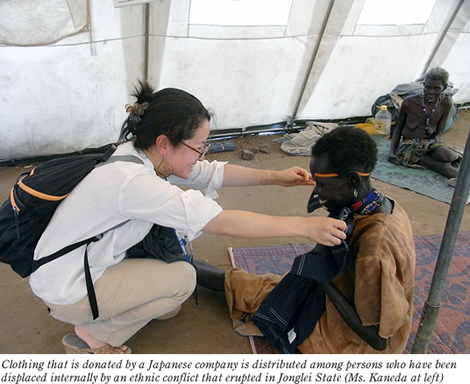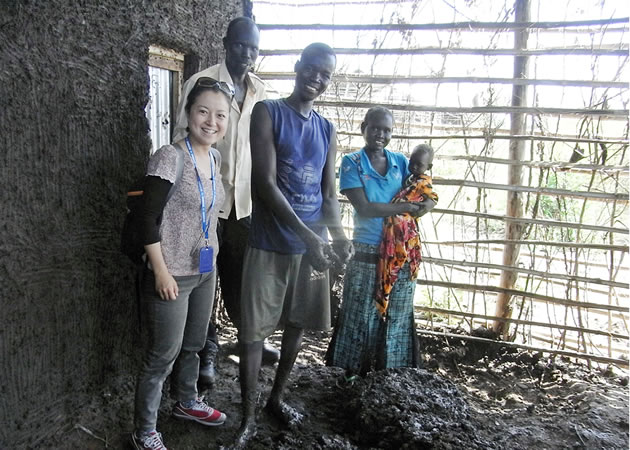A Field Report from South Sudan on Peacebuilding Assistance in a Post-Independence Setting:
Assistance Provided by the Office of the United Nations High Commissioner for Refugees (UNHCR)
![]()
 On July 9, 2011, the new state of the Republic of South Sudan was born as the 193rd member state of the United Nations. Many precious lives were lost and numerous people had fled to neighboring countries as refugees caused by Sudanese civil war that had lasted for about four decades. The newly independent state South Sudan is still unstable. While ethnic conflicts continue to ravage the country, air strikes, allegedly carried out by the Sudan Armed Force, generate refugees in the area near the undefined north and south border at the time of independence of South Sudan.
On July 9, 2011, the new state of the Republic of South Sudan was born as the 193rd member state of the United Nations. Many precious lives were lost and numerous people had fled to neighboring countries as refugees caused by Sudanese civil war that had lasted for about four decades. The newly independent state South Sudan is still unstable. While ethnic conflicts continue to ravage the country, air strikes, allegedly carried out by the Sudan Armed Force, generate refugees in the area near the undefined north and south border at the time of independence of South Sudan.
Under the circumstances, UNHCR South Sudan office focuses on two major areas of activities: (i) support for the repatriation and the resettlement of returnees from Sudan and other neighboring countries; and (ii) emergency humanitarian relief for Internally Displaced Persons (IDPs) caused by the ethnic conflicts and Sudanese refugees near the border. I have been dispatched to UNHCR South Sudan office as a UN volunteer under the Program for Human Resource Development in Asia for Peacebuilding by the Ministry of Foreign Affairs of Japan. This program offers a six-week training on peacebuilding to Japanese and Asian Program Associates(PAs) in Japan, after which all Japanese and some of Asian PAs dispatches to fields of peacebuilding around the world as UN volunteers. The period of overseas attachment is one year for Japanese PAs and six months for some Asian PAs.
I majored in architecture in the university as I was motivated to tackle housing problems in developing countries. While in the university, I served as an intern for UN agencies in Indonesia and supported reconstruction efforts in the aftermath of the 2004 earthquake off the coast of Sumatra and the 2006 earthquake in central Java. After graduating, I joined a private management consulting firm and acquired various skills. Through the experience in the private company, I desired to challenge for the work of assistance to developing countries. The desire finally urged me to apply to this program.
The reintegration unit of UNHCR South Sudan office provides assistance to returnees peacefully reintegrated into local communities. This project aims at supporting returnees and host communities to promote peaceful coexistence without any conflicts over limited resources (water, land, etc.) and social facilities (clinics, schools, etc.). My main task at the unit is the management of the shelter project for returnees, which is underway in all ten states in South Sudan. Since the project is unable to cover all returnees, it focuses its targets on some vulnerable returnees’ groups such as the elderly, single mothers, and child-only families.
Working in a country far from Japan where the culture and values are different does involve some difficulties as well as delightful experiences. Something that I find difficult to understand in daily life is the diversity of disposition that varies from one tribe to another, and the sentiment that each of the tribes has toward each other. There is still demarcation line among tribes: people in South Sudan think of themselves more as the Dinka, the Murle, the Nuer, and so forth than as “the South Sudanese.” I have to take different approaches to communicate with different people because of their distinctive dispositions. In order that South Sudan becomes an affluent unified nation in the long run, it is required that they make efforts to get over the demarcation line among tribes and to contribute to the development of the nation as the South Sudanese. In the meantime, the time I feel glad about working here, despite the heat and infectious diseases such as malaria, is when I see the beneficiaries decorating their shelters in their own way and reconstructing their lives. It gives me a great pleasure to see the people using their creativities to make their shelters “their own house and the basis for rebuilding their lives,” something more than just shelters, without merely depending on assistance.
When I applied for this program, I was somewhat worried about what I could do in the unfamiliar area of peacebuilding. However the short-term training course gave me the basic knowledge and enabled me to join a network of civilian experts around the world. I learned in the field that civilian experts in various fields utilize the advantage of their own expertise under the broad concept of peacebuilding. Before joining this program, I thought that only specialists of peace studies, human rights, international politics, humanitarian assistance or other related areas were working in the field of peacebuilding. However, what I realized here is that wide range of expertise will be useful in the field of peacebuilding. For instance, in the case that an ethnic conflict occurred in one of the states; villages are set on fire, leaving many people injured and homeless. The evacuation of the injured may not be possible without a pilot, and the delivery of emergency humanitarian relief such as food, water, and shelter to the homeless may not be possible without people experienced in procurement, logistics, financing or engineering. To put it another way, expertise of various fields that private sector workers in developed countries have acquired through their specialised work has an important role to play in peacebuilding. It is needless to say that human resources like Japanese, who are generally hard-working, assiduous, and precise, are needed in what may be at the center of humanitarian assistance, which does not have a moment to lose.
In my future, I hope to build specialities on my field experience under this program, and to become a peacebuilder to contribute to peacebuilding.
Keiko Kaneda
Program Associate of the Program for Human Resource Development in Asia
for Peacebuilding,
UNHCR South Sudan

The shelter project for returnees in Central Equatoria State

